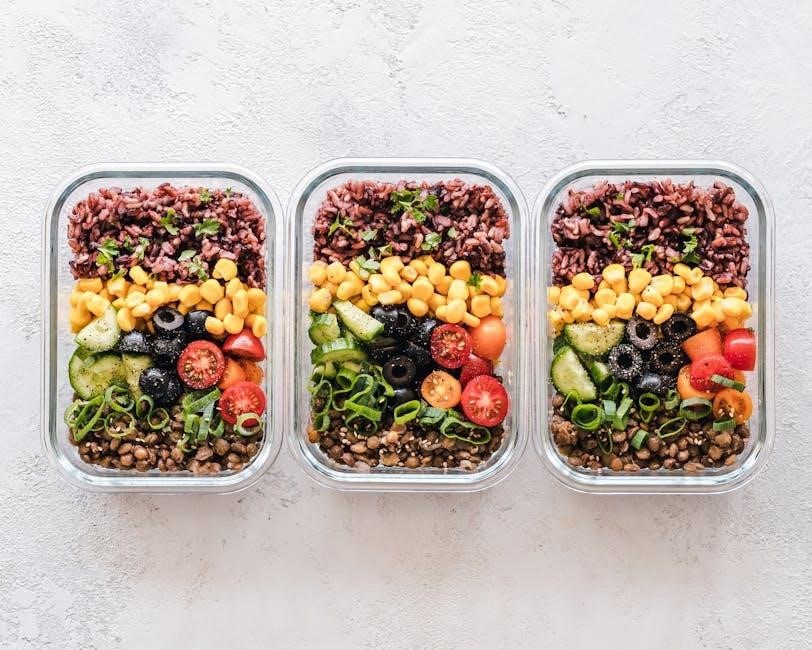
This structured plan offers a comprehensive guide to managing endometriosis symptoms through diet. It includes delicious, anti-inflammatory recipes and strategies to help reduce discomfort and improve well-being naturally.
Understanding Endometriosis and Its Symptoms
Endometriosis occurs when tissue similar to the lining of the uterus grows outside it, causing pain, heavy bleeding, and fatigue. Symptoms include pelvic pain, digestive issues, and infertility. It is influenced by hormonal and inflammatory factors, making dietary changes a key component in managing discomfort and improving quality of life.
The Role of Diet in Managing Endometriosis
Diet plays a crucial role in managing endometriosis by reducing inflammation and balancing hormones. Anti-inflammatory foods, omega-3s, and antioxidants help alleviate symptoms like pelvic pain and bloating. A tailored diet can support overall health and improve quality of life for women with endometriosis, offering a natural complement to medical treatments.
Benefits of a Structured 4-Week Meal Plan
A structured 4-week meal plan provides clarity and organization, helping individuals stick to anti-inflammatory diets. It offers balanced nutrition, reduces symptom triggers, and introduces beneficial foods gradually. This plan promotes sustainable habits, supporting long-term health and symptom management for those with endometriosis.

The Science Behind the Endometriosis Diet
This diet focuses on reducing inflammation and balancing hormones through nutrient-rich foods. It targets underlying causes of endometriosis, promoting healing and symptom relief with tailored nutrition.
How Diet Affects Hormones and Inflammation
Diet significantly impacts hormone levels and inflammation, key factors in endometriosis. Anti-inflammatory foods like fruits, vegetables, and omega-3 rich options help reduce inflammation and lower estrogen levels, alleviating symptoms. A balanced intake of antioxidants supports overall health and minimizes discomfort associated with the condition.
The Importance of Anti-Inflammatory Foods
Anti-inflammatory foods are crucial in managing endometriosis by reducing inflammation and alleviating symptoms. Rich in antioxidants and omega-3 fatty acids, these foods help combat oxidative stress and promote healing. Incorporating them into your diet supports overall health and can significantly improve your well-being during the 4-week plan.
Impact of Omega-3 Fatty Acids and Antioxidants
Omega-3 fatty acids reduce inflammation, alleviating endometriosis-related pain. Antioxidants combat oxidative stress, promoting healing. Together, they support hormonal balance and reduce symptom severity. Incorporating these nutrients into your 4-week diet plan enhances overall well-being and aids in managing endometriosis effectively.

Key Foods to Include in Your Diet
Focus on anti-inflammatory and nutrient-rich foods like fruits, vegetables, and whole grains. Include omega-3 sources such as fatty fish, nuts, and seeds. Legumes and leafy greens also support hormonal balance and reduce inflammation, aiding in managing endometriosis symptoms effectively.
Anti-Inflammatory Foods: Fruits, Vegetables, and Whole Grains
Anti-inflammatory foods like berries, citrus fruits, and leafy greens are rich in antioxidants, reducing inflammation and hormone imbalance. Vegetables such as spinach, broccoli, and bell peppers provide essential vitamins and minerals. Whole grains like quinoa and brown rice offer fiber, supporting digestion and hormone regulation, which are crucial for managing endometriosis symptoms effectively.
Omega-3 Rich Foods: Fatty Fish and Nuts
Fatty fish like salmon, sardines, and mackerel are rich in omega-3 fatty acids, which reduce inflammation and hormone sensitivity. Nuts such as walnuts and flaxseeds also provide omega-3s, supporting anti-inflammatory responses. Incorporating these foods into your diet can help alleviate endometriosis symptoms and promote overall hormonal balance.
Fiber-Rich Foods: Legumes and Leafy Greens
Legumes, such as lentils, chickpeas, and black beans, and leafy greens like spinach and kale, are rich in fiber, which supports digestion and hormone balance. These foods help reduce inflammation, combat bloating, and regulate estrogen levels, making them essential for managing endometriosis symptoms and improving overall well-being.
Foods to Avoid or Limit
Certain foods can trigger inflammation and worsen endometriosis symptoms. The 4-week plan recommends minimizing these to promote healing and balance, focusing on symptom management through dietary adjustments.
Red Meat and Processed Foods
Red meat and processed foods can trigger inflammation and worsen endometriosis symptoms. They contain pro-inflammatory compounds and advanced glycation end (AGE) products, which promote oxidative stress. Limiting or avoiding these foods is recommended to reduce symptom severity and support hormonal balance, aiding in overall management of endometriosis.
Gluten and Dairy Products
Some women with endometriosis find relief by reducing gluten and dairy, as these can trigger inflammation and digestive discomfort. While not all plans restrict them entirely, moderation is key. Dairy contains natural hormones, and gluten can irritate sensitive digestive systems, potentially worsening symptoms in some individuals.
High-FODMAP Foods and Sugary Drinks
High-FODMAP foods, such as certain legumes and vegetables, and sugary drinks can worsen digestive discomfort and inflammation. Limiting these can help reduce bloating and pain, common in endometriosis. Opt for low-FODMAP alternatives and natural beverages like water or herbal teas to support symptom relief and improve overall well-being during the diet plan.
Structure of the 4-Week Diet Plan
This 4-week plan is divided into phases, starting with elimination, followed by reintroduction, and ending with maintenance. It focuses on anti-inflammatory foods and balanced nutrition to reduce inflammation and improve well-being.
Overview of the 4-Week Plan
This 4-week plan is designed to help manage endometriosis symptoms through strategic dietary changes. It begins with an elimination phase to identify triggers, followed by reintroduction and maintenance phases. The plan focuses on anti-inflammatory foods, balanced nutrition, and customizable meals to reduce inflammation, balance hormones, and improve overall well-being.
Caloric Intake and Macronutrient Balance
The 4-week plan provides 1500-2200 calories daily, balancing carbohydrates, proteins, and healthy fats. This macronutrient balance supports energy levels and reduces inflammation, aiding in endometriosis symptom management. The focus is on whole, nutrient-rich foods to optimize hormonal balance and overall well-being.
The 4-week plan begins with an elimination phase to identify trigger foods, followed by gradual reintroduction. This structured approach helps pinpoint sensitivities and inflammation causes. The non-restrictive plan focuses on anti-inflammatory foods, allowing for personalized adjustments and symptom monitoring, with guidance from nutritionists to ensure a tailored and effective dietary strategy.
Weekly Meal Plan Breakdown
This 4-week plan provides structured meals and recipes, focusing on anti-inflammatory foods to alleviate symptoms and promote healing through balanced nutrition.
Week 1: Elimination Phase
Week 1 focuses on removing common triggers like gluten, dairy, and processed foods. Emphasize anti-inflammatory foods, such as fruits, vegetables, and omega-3 rich sources. This phase aims to reduce inflammation, balance hormones, and identify potential food sensitivities. Include leafy greens, berries, and fatty fish to support healing and minimize symptoms effectively.
Week 2 introduces previously eliminated foods one at a time, such as gluten or dairy, to assess tolerance. Monitor symptoms closely to identify triggers. Continue focusing on anti-inflammatory choices while gradually expanding your diet. This phase helps personalize your plan and ensures a balanced approach to managing endometriosis symptoms effectively.
Weeks 3-4: Maintenance and Variety
Weeks 3-4 focus on maintaining the anti-inflammatory diet while introducing variety to keep meals interesting. Emphasize nutrient-dense foods, balanced macronutrients, and proper hydration. Continue monitoring symptoms and adjust as needed. This phase aims to establish long-term eating habits that support overall health and reduce endometriosis-related discomfort effectively.
Delicious and Nutritious Recipes
Discover tasty, hormone-balancing meals designed to reduce inflammation and support healing. From smoothies to stir-fries, these recipes offer variety and nutrient-rich options for optimal health.
Breakfast Recipes: Smoothies and Oatmeal
Nourish your mornings with anti-inflammatory smoothies and oatmeal recipes. Berry blends with spinach, chia seeds, and almond milk reduce inflammation. Oatmeal topped with fruits and nuts provides sustained energy. These breakfast options are rich in fiber, antioxidants, and omega-3s, supporting hormone balance and symptom relief throughout the day.
Lunch Recipes: Salads and Grilled Fish
Enhance your midday meals with vibrant salads and grilled fish, packed with anti-inflammatory properties. Combine leafy greens, colorful vegetables, and berries for a nutrient-rich base. Grilled fish like salmon offers omega-3 fatty acids, reducing inflammation. These recipes support hormone balance and provide sustained energy, aligning perfectly with your endometriosis management goals.
Dinner Recipes: Stir-Fries and Baked Vegetables
Conclude your day with nutritious stir-fries and baked vegetables, tailored to ease endometriosis symptoms. Stir-fries combine colorful vegetables and lean proteins, while baked options highlight fiber-rich seasonal produce. These meals are designed to reduce inflammation, support digestion, and promote a restful evening, aligning with your dietary goals for symptom relief and overall well-being.
Supplements for Support
Supplements like magnesium, iron, and zinc provide essential nutrients to alleviate symptoms. Antioxidants and omega-3 fatty acids further support hormonal balance and reduce inflammation, enhancing overall well-being.
Magnesium and Iron Supplements
Magnesium aids in muscle relaxation and sleep quality, reducing cramps. Iron supports blood health, crucial for women with heavy periods. Both supplements, combined with a balanced diet, can help alleviate symptoms and improve energy levels in the 4-week endometriosis plan. Always consult a healthcare provider for proper dosage and safety.
Zinc and Antioxidant Supplements
Zinc supports immune function and hormone balance, while antioxidants combat oxidative stress. These supplements work synergistically in the endometriosis diet plan to reduce inflammation and alleviate pain. Including them can enhance the effectiveness of dietary changes and promote overall well-being. Always choose high-quality options and consult a professional for guidance.

Lifestyle Changes for Success
Regular physical activity, hydration, and stress management are crucial. Exercise reduces symptoms, while practices like yoga or meditation help alleviate stress, promoting overall well-being and symptom relief.
Exercise and Physical Activity
Regular physical activity, such as yoga, swimming, or cycling, helps reduce endometriosis symptoms by improving blood flow and reducing inflammation. Strength training and low-impact aerobics can also alleviate pain and promote hormonal balance. Aim for at least 30 minutes of moderate exercise most days to support overall well-being and symptom relief.
Stress Management Techniques
Stress management is crucial for endometriosis care, as high stress levels can worsen symptoms. Techniques like meditation, yoga, and deep breathing can reduce cortisol levels, lowering inflammation and improving hormonal balance. Regular practice helps alleviate pain, enhances mental health, and supports overall well-being, making it easier to manage endometriosis symptoms effectively.
Hydration and Sleep
Proper hydration and adequate sleep are vital for managing endometriosis symptoms. Drinking 8-10 glasses of water daily helps flush toxins and reduce inflammation. Aim for 7-9 hours of quality sleep nightly to support hormonal balance and healing. Prioritize a relaxing bedtime routine, such as herbal teas or reading, to enhance sleep quality.
Monitoring Your Progress
Track your symptoms, energy levels, and digestion daily. Adjust the diet plan as needed and consult your healthcare provider regularly to ensure the best results and address any concerns.
Tracking Symptoms and Adjustments
Keep a detailed journal to monitor pain levels, digestion, and energy. Note improvements or setbacks to identify dietary triggers. Adjust the plan based on your body’s response and consult your healthcare provider for personalized tweaks to maximize symptom relief and overall well-being throughout the 4-week program.
Seeking Professional Guidance
Consult a healthcare provider or dietitian before starting the plan. They can tailor the diet to your needs, ensuring nutritional balance and addressing specific health concerns. Professional guidance helps maximize benefits and minimizes potential side effects, supporting a safe and effective approach to managing endometriosis symptoms.

Common Mistakes to Avoid
- Overconsumption of restricted foods can hinder progress and worsen symptoms.
- Not adhering to the elimination phase may prevent identifying triggers.
- Inadequate hydration and nutrient intake can exacerbate discomfort.
Overconsumption of Restricted Foods
Consuming restricted foods like red meat, processed items, gluten, and dairy can trigger inflammation and worsen symptoms. It’s crucial to avoid these to minimize discomfort and support healing. Overindulgence can lead to increased inflammation and estrogen levels, exacerbating pain and bloating. Stick to anti-inflammatory options and stay committed to the diet plan for best results.
Inadequate Hydration and Nutrient Intake
Inadequate hydration and poor nutrient intake can worsen endometriosis symptoms, leading to increased pain and fatigue. Proper hydration helps flush toxins, while essential nutrients support hormonal balance and reduce inflammation. Ensure a balanced intake of vitamins, minerals, and omega-3 fatty acids to optimize healing and overall well-being throughout the diet plan.
Long-Term Maintenance
Continuing an anti-inflammatory diet, staying hydrated, and scheduling regular health check-ups are crucial for long-term symptom management and overall well-being in women with endometriosis.
Continuing the Anti-Inflammatory Diet
Committing to an anti-inflammatory diet long-term is essential for managing endometriosis symptoms. Focus on whole, nutrient-rich foods like fruits, vegetables, whole grains, and omega-3 sources. Avoid processed foods and maintain hydration and sleep for optimal benefits, supporting hormonal balance and reducing inflammation effectively over time.
Regular Health Check-Ups
Regular health check-ups are crucial for monitoring endometriosis progression and adjusting treatment plans. Schedule consistent appointments with your healthcare provider to track symptoms, discuss dietary adjustments, and ensure overall well-being. These visits help maintain a proactive approach to managing the condition and preventing complications.
This 4-week plan empowers you to manage endometriosis symptoms through diet, offering a clear path to improved well-being. Stay committed to nutrition and lifestyle changes for long-term relief and enhanced health.
This plan reduces inflammation, balances hormones, and alleviates symptoms like pain and bloating. It promotes long-term well-being through nutrient-rich, anti-inflammatory foods, empowering women to take control of their health and manage endometriosis effectively with sustainable dietary changes.
Encouragement for Ongoing Commitment
Embrace this journey as a lifelong path to wellness. By committing to anti-inflammatory, nutrient-rich eating, you can reduce symptoms, enhance energy, and reclaim control over your health. Consistency is key—celebrate small victories and stay dedicated to nurturing your body for long-term relief and vibrant well-being.